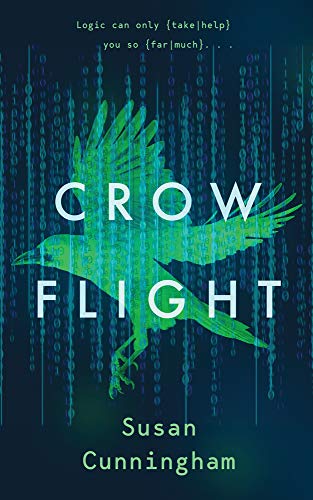REVIEW: "Crow Flight" by Susan Cunningham
Despite the fact that I do tend to prefer reading and the arts over maths and sciences, I have always found comfort in the logic of these rigid subjects.
It’s comforting to feel like there is a definitive answer.
A right and a wrong.
A black and a white.
Because, in truth, shades of gray are scary as fuck.
But even though I appreciate the inflexibility of diametric relationships and logic-driven decision making, I know that there are some areas in which logic simply can’t be applied.
Love — as I know from first-hand experience and the protagonist of this novel ultimately comes to find — is one of those areas.
Early in this novel, as almost a nothing aside, the character marvels on the inconceivability of love at first sight — the absurdity of believing that you can see someone and just… know… that you are meant to be with him or her.
While I might, too, have argued that this notion was ridiculous when I, like the protagonist, was an inexperienced high schooler, I now feel quite the opposite.
Because it’s what I experienced.
Awkward and perpetually single, I spent my college years focusing more on my studies than on guys. Given my singular academic focus, I was all but certain I would exit college just as I had entered it — single as fuck.
But then, I made a new friend.
And, one day, this friend came over my apartment and, before deciding to join me for dinner, called his roommate, Eric, and inform him that he wouldn’t be home as soon as he had planned.
So I stood there, listening to him make his call.
And the moment I heard Eric’s voice, faint and tinny, on the other side of the phone, I was struck with one thought: I’m going to marry that man.
And then I met Eric.
And I decided I definitely wouldn’t marry him.
He was loud and impossibly tidy and goofy — all things I most certainly was not.
And so we became friends.
Until one night when, emboldened by a shit ton of vodka, we became more.
Now nearly 13 years and two sons later, I have no choice but to believe that fate is real.
That love is complicated.
And that logic, while comforting, can only get you so far.
And that’s bad news for Gin, the protagonist of this STEM-rich YA novel.
While many people find comfort in logic, Gin absolutely cannot operate even in the most basic sense outside of the matrix of yes and no decisions.
She’s so dependent on logic, in fact, that she has dedicated a tremendous amount of time to building computer models to help her decide everything from what to wear to what she should eat.
As she starts her senior year, she — like college-aged me — is absolutely focused on her academics. Unlike me, though, Gin has an exceedingly lofty goal: to gain admission to Harvard.
Though she knows that this will be a difficult feat to accomplish, she’s been painstakingly careful in putting herself on the right path. She’s stacked her schedule to impress, including securing a spot in an advanced modeling class taught by a visiting professor, Dr. Sandlin. Not only will performing well in this class prove impressive to Harvard recruiters, it might also help Gin secure an almost-impossible-to-come-by spot as a summer intern working under Dr. Sandlin.
But then, things get complicated.
On the first day of school, Gin meets a magnetic new student, Felix.
Logical and focused, Gin tries to ignore the confusing and potentially disruptive feelings she starts to experience when Felix is in her sights.
But when she is, by some joke of fate, assigned to partner with Felix, the intricate system of logic by which she has lived her life starts to feel woefully inadequate to address her current issues.
Then, to make matters worse, what starts out as a simple modeling project focusing on the behavior of crows — a particular area of interest for Felix and his family — becomes complicated by the discovery of something more important than Gin ever could have expected.
The discovery is so significant, in fact, that it threatens to derail all of Gin’s carefully laid plans.
Crow Flight was inarguably a distinctive book.
Rather surprisingly, given the push within the field of education to increase the focus on STEM (science, technology, engineering & math), there isn’t much YA literature that really is truly STEM-rich.
And the literature that exists that does have STEM elements almost never goes into as much technical depth as this novel did.
Despite the author’s decision to explore some complex technical topics, however, the novel never felt clunky or boring or unreadable.
By maintaining a focus on the characters — and, more importantly, their relationships — Cunningham prevented what could have become an arduous read from veering off into the weeds.
But while she developed her lead character, Gin, relatively well, secondary characters didn’t receive the same attention. As a result, many of the secondary characters, including Gin’s best friend and even her parents, appearing flat and artificial. This was… disappointing… particularly because the problem could have been solved with the addition of just a few new scenes focusing on this secondary cast and giving them more of the independent ambitions and personal attributes that would have been necessary for them to be juicy, round, dynamic characters that we as readers would care about.
As I let this novel settle in my brain and tried to decide how I felt about it as an overall work, not as a bunch of component parts, one element of the book popped into my head: the concept of soul bits.
In the novel, our love interest, Felix, explains that one of the things that distinguishes a merely functioning model from a truly amazing one is a soul bit.
A soul bit is that little something special.
It’s that magic ingredient that isn’t founded in logic like the other components of the model. And because the soul bit isn’t logical, it allows the model to more closely replicate real life.
With the concept of a soul bit in my mind, I realized what this book was missing.
It was missing its soul bit.
I would guess that the author herself tends towards the linear thinking that computer programmers and modelers favor.
Because this novel, like a computer program, gets the job done in the most basic sense of the word.
This novel is complete.
The story is sound.
The plot is cohesive.
Were it a model, it would be fully functional.
But would it be amazing, special, world-altering?
Sadly, no.
While absolutely a take on an oft-ignored topic, it is missing some of the… sparkle… that I believe the addition of some soul bits… some personality… some life… would truly add.
As it stands, it earns 3 out of 5 cocktails.
What do you think about love at first sight? Is it a true phenomenon, or just a fairytale? Give me your take on this topic in the comments, below.
On to my next read. Keep on top of what I’m reading by following me, here.
* Drink. Read. Repeat. is a participant in the Amazon Services LLC Associates Program, an affiliate advertising program designed to provide a means for sites to earn advertising fees by advertising and linking to Amazon.com. As an associate, we may earn commissions, at no cost to you, from qualifying purchases on Amazon.com











